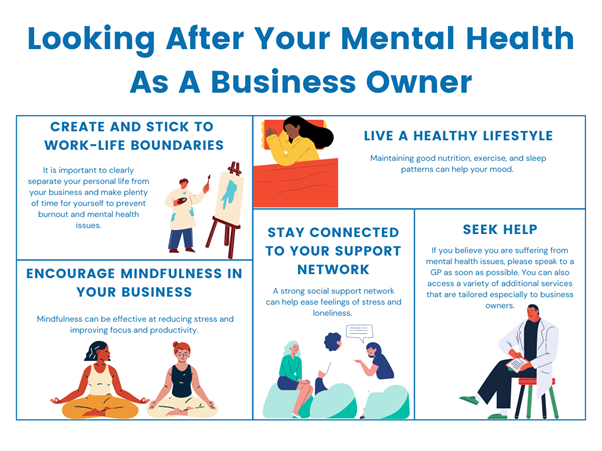Small business owner mental health is an increasingly urgent topic in today’s economy, especially in Australia, where the pressures of entrepreneurship can significantly impact emotional wellbeing. Owners of small businesses often grapple with unique challenges, including financial stress, long hours, and the constant pressure to perform, which can lead to high rates of anxiety and depression. Research shows that business owners are more likely to experience mental health issues compared to the general population, highlighting the need for effective mental health support systems tailored to their unique experiences. The economic impact of mental health on small businesses is substantial, resulting in lost productivity that can cost the Australian economy billions annually. As such, it is critical to prioritize mental health programs that provide accessible support for small businesses, ensuring they can thrive both professionally and personally.
The mental wellbeing of entrepreneurs and proprietors holds great significance, particularly in the context of small enterprises that contribute richly to the economy. Facing various small business challenges, owners often struggle with unrelenting stress and the emotional toll of their responsibilities, underscoring the need for comprehensive mental health care. In Australia, mental health initiatives aimed at this demographic are essential for fostering resilience and enhancing productivity within the sector. Given that these individuals frequently feel isolated and overwhelmed, implementing targeted support for small business proprietors can create a healthier work environment and mitigate the adverse economic effects associated with mental health issues. Enhancing awareness and accessibility of mental health resources will serve as a vital step in recognizing and addressing the specific needs of those leading small businesses.
The Current Mental Health Crisis for Small Business Owners
In Australia, small business owners (SBOs) are experiencing an alarming mental health crisis, characterized by significantly high rates of stress, anxiety, and depression. This precarious situation can be attributed to various factors unique to the small business environment, including financial pressures, long working hours, and feelings of isolation. As indicated by the Wellbeing and Prevention Coalition, these mental health struggles are not only personal but also have far-reaching implications for the economy, affecting productivity and the overall health of communities. Without immediate intervention and support tailored to their specific needs, many SBOs risk severe emotional and economic downturns.
The importance of prioritizing mental health support cannot be overstated, particularly as small businesses represent nearly half of Australia’s private sector workforce. Mental health challenges faced by SBOs carry significant economic repercussions, with research suggesting that untreated mental health issues could cost the Australian economy upward of $220 billion each year. Addressing these challenges through effective policies and mental health support programs is crucial to maintaining the viability of small businesses and ensuring their contribution to the national economy.
Investing in Targeted Mental Health Support Programs
To truly understand and address the mental health challenges of small business owners, tailored support programs are essential. Initiatives like Beyond Blue’s NewAccess for Small Business Owners (NASBO) provide a free and confidential service that assists SBOs in managing their mental wellbeing before issues escalate into crises. Programs like these are developed with the unique experiences of small business owners in mind, offering practical and accessible mental health support that speaks to their everyday challenges. Through such initiatives, SBOs can obtain the resources they need to foster healthier work environments and connect with qualified mental health professionals who understand their situation.
Moreover, government investment in mental health resources targeted specifically at small business owners must be established. This includes developing policies that reflect the voices and experiences of SBOs, thereby creating a robust support system that guides them in mitigating mental health risks. Effective mental health strategies should involve collaboration with SBOs themselves, ensuring that the solutions offered are both practical and influential within their daily operations.
Economic Impacts of Mental Health Issues on SBOs
The economic impact of mental health issues on small business owners extends beyond individual distress; it affects the broader economy significantly. With small businesses accounting for a substantial portion of employment in Australia, neglecting the mental well-being of their owners threatens to disrupt not only the personal livelihoods of these entrepreneurs but also the jobs of their employees. Georgie Harman, CEO of Beyond Blue, emphasizes the connection between poor mental health and productivity losses, which cumulatively costs billions to the economy in lost output, increased absenteeism, and decreased workforce engagement.
Addressing the mental health crisis among SBOs, thus, becomes a matter of economic urgency. Investing in mental health support not only benefits the individual business owners but has a cascading effect throughout the economy. By fostering a culture of well-being and support, businesses can innovate, grow, and contribute positively to the economic fabric of Australia. Enhanced mental health assistance for SBOs can lead to sustainable business practices and overall economic resilience.
Unique Challenges Faced by Small Business Owners
Small business owners in Australia face a multitude of unique challenges that contribute to their struggles with mental health. Unlike employees in larger firms, SBOs often work in isolation, dealing with financial pressures and operational hurdles without a support system readily available. Luke Achterstraat, CEO of COSBOA, points out that many SBOs lack access to mental health resources and information, which exacerbates their existing pressures. This lack of visibility and awareness surrounding available support programs can leave many owners feeling overwhelmed and unable to cope.
In addition to professional isolation, SBOs are also subjected to an array of responsibilities that extend beyond basic operations, including employee management, customer relations, and continual decision-making under pressure. These compounded duties do not allow for the typical courses of relief or self-care that might be available in a corporate structure. To combat this, it’s crucial for support initiatives to be communicated effectively within the small business community using trusted channels that SBOs frequent. Accessible mental health resources should be integrated into daily business communications, ensuring that help is not only available but also recognized as part of operational success.
The Importance of Preventative Mental Health Strategies
Preventative mental health strategies are vital for small business owners to reduce the risk of falling into crisis situations. The proactive approach to mental health emphasizes the importance of early intervention, allowing SBOs to identify issues before they escalate. Programs that provide workshops, mental health training, and counseling services can equip small business owners with the skills needed to manage their mental health effectively. As SMBs often face high-stress levels due to their multifaceted roles, having preventative measures in place can significantly reduce the likelihood of mental health issues arising.
Furthermore, enhancing awareness about mental health resources available to SBOs is paramount. Educational outreach should aim to destigmatize seeking help and encourage early engagement with mental health services. By fostering a workplace culture that values mental wellbeing, small business owners can create a supportive environment for themselves and their employees, ultimately leading to more sustainable operations. Continuous investment in such preventative strategies can lead to healthier work-life balances for SBOs, better overall wellbeing, and improved business resilience.
The Role of Government in Supporting SBO Mental Health
Government action is crucial in addressing the mental health challenges faced by small business owners. The mental health crisis within this demographic necessitates immediate attention and viable solutions, including the allocation of funds for programs that cater to their unique needs. Policies should be designed with small business perspectives in mind, ensuring that they are relevant and effective. Appropriately addressing these issues through legislation can lead to favorable outcomes that support both the economy and the mental health of these key contributors.
In addition to funding, government initiatives must focus on building awareness of available mental health services explicitly designed for small business owners. By promoting accessibility and awareness, governments can ensure that more SBOs benefit from the support systems designed to help them manage their mental health. Collaborating with organizations like COSBOA and mental health advocates can help tailor these initiatives, making them sensitive to the specific pressures that small business owners face and enhancing their overall effectiveness.
Personal Testimonials Highlighting the Need for Change
Personal experiences from small business owners, such as those shared by Jeremy Suggett, underscore the urgent need for tailored mental health support systems. His account highlights the everyday struggles that SBOs endure, such as feeling overwhelmed and losing interest in basic self-care routine due to the pressures of running a business. Testimonials like Suggett’s emphasize that business owners need flexible support that acknowledges their unique pressures, allowing them to maintain their operations while also addressing their mental health.
The stories of SBOs in distress further reveal systemic gaps in mental health support and point toward the need for a paradigm shift in how mental health resources are allocated. By listening to these voices, stakeholders can advocate for policies that resonate with the experiences of small business owners, ensuring that mental health support aligns with their realities. Continued dialogue between government, mental health organizations, and SBOs is essential to develop timely responses and effective solutions.
Integrating Mental Health Support into Business Practices
Integrating mental health support into the everyday practices of small business is essential for creating a sustainable workplace culture. This may include implementing regular check-ins for teams, encouraging open conversations around mental health, and offering resources that promote wellbeing. By fostering a culture where mental health is prioritized, SBOs can create an environment that not only benefits their owners but also their employees, leading to higher morale and productivity.
Moreover, providing training for business leaders on mental health awareness can equip them with the skills to identify potential issues among their staff and address them before they escalate. Workshops and continued education on mental health topics should be made available, creating a comprehensive support framework. When mental health becomes an integral part of business operations, it contributes to a positive atmosphere, enhances team cooperation, and leads to increased overall performance.
Raising Awareness for Mental Health Resources
Raising awareness about mental health resources available for small business owners is vital to ensuring they can access the help they need. Many SBOs remain unaware of the programs that can provide essential support, leading to feelings of helplessness and isolation. It is essential for organizations to disseminate information widely, using channels that reach business owners effectively, such as existing business networks, trade associations, and community organizations. By doing so, we can bridge the gap between available resources and those who need them most.
Furthermore, leveraging successful platforms like Beyond Blue and Everymind can serve as a model for how to communicate mental health resources effectively. By engaging with SBOs and involving them in the development of outreach strategies, organizations can better articulate the specific benefits of available programs, creating tailored messages that resonate with this unique audience. Raising awareness and promoting accessible mental health services should become a collective responsibility involving both government and private sectors, ensuring that no SBO is left without support.
Frequently Asked Questions
What are the common mental health challenges faced by small business owners in Australia?
Small business owners in Australia frequently encounter higher levels of stress, anxiety, and depression compared to the general population. Factors such as financial pressures, long working hours, and isolation contribute to these mental health challenges, indicating an urgent need for tailored mental health support.
How does poor mental health among small business owners impact the economy?
Poor mental health among small business owners significantly affects productivity and can cost the Australian economy up to $220 billion annually. As vital contributors to the workforce, the mental health of small business owners is crucial for economic stability, highlighting the need for effective mental health support.
What mental health support options are available for small business owners?
Small business owners can access various mental health support programs such as Beyond Blue’s NewAccess for Small Business Owners and Everymind’s Ahead for Business. These resources provide confidential and tailored support aimed at preventing mental health issues from escalating, specifically addressing the unique challenges faced by SBOs.
Why is there a need for increased government investment in small business owner mental health?
Increased government investment in small business owner mental health is critical due to the alarming rates of mental health issues within this sector. Many small business owners struggle to find affordable, accessible mental health support, and targeted funding can help provide essential resources and programs to address these challenges.
How can small business owners better manage their mental health amidst business pressures?
To manage their mental health effectively, small business owners should seek professional support, prioritize work-life balance, and establish supportive networks. Utilizing available mental health resources and engaging in self-care practices can help navigate the unique pressures of entrepreneurship.
What role do policies play in supporting small business owner mental health?
Policies aimed at supporting small business owner mental health are essential for creating systemic change. By involving small business owners in policy development and increasing funding for mental health programs specifically designed for them, the unique needs of this sector can be addressed, helping to mitigate mental health risks.
How can small businesses access mental health resources more effectively?
To access mental health resources more effectively, small business owners should seek information from trusted channels, such as industry associations and local business networks. Increased visibility and outreach of mental health programs can help ensure that SBOs are aware of the support options available to them.
What are the long-term benefits of prioritizing mental health for small business owners?
Prioritizing mental health for small business owners leads to improved productivity, better employee retention, and a healthier work environment. By investing in mental health support, small businesses can foster resilience, reduce turnover costs, and contribute positively to the overall economy.
| Key Point | Details |
|---|---|
| High Rates of Mental Ill-Health | Small business owners in Australia face alarming rates of stress, anxiety, and depression. |
| Economic Impact | Poor mental health costs the Australian economy approximately $220 billion annually due to lowered productivity. |
| Unique Pressures | SBOs experience financial pressures, isolation, and long working hours, which contribute to mental health issues. |
| Lack of Access to Support | Many small business owners struggle to find affordable and suitable mental health support programs. |
| Need for Tailored Policies | Current policies often overlook small businesses, requiring inclusion of SBO perspectives and tailored solutions. |
| Successful Programs | Initiatives like Beyond Blue’s NewAccess for Small Business Owners help prevent mental health crises |
Summary
Small Business Owner Mental Health is a critical issue that demands immediate attention and action. With small business owners facing unprecedented levels of stress, it’s vitally important for governmental bodies and organizations to invest in targeted mental health support systems. By prioritizing the unique pressures and needs of these entrepreneurs, we can foster healthier workplace environments, improve overall wellbeing, and ultimately contribute to a more robust economy. Accessible and flexible mental health resources must be established to address the specific challenges encountered by small business operators, ensuring that they receive the support they truly need.



